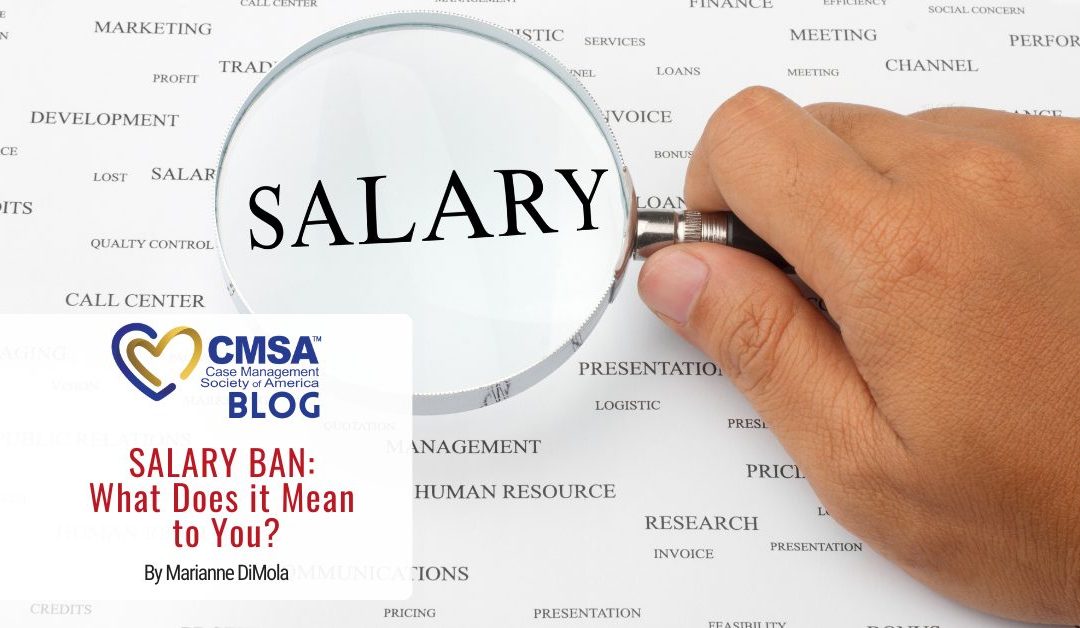By: Marianne DiMola
I recently had the privilege of giving a presentation with my good friend Laura Ostrowsky on best practices in interviewing at the CMSA National Conference this past June. I was surprised to learn that so many were not aware of the salary ban. So, I thought I would take this time to go into a little more detail on the salary ban and what it means to you.
As per Women’s Bureau U.S. Department of Labor “Salary history bans are policies that prohibit employers from asking about and/or relying on a job applicant’s prior salary in hiring and compensation decisions." These bans have varying levels of protection and scope. As of January 2023, 16 states and Puerto Rico, and a variety of cities and counties, have implemented salary history bans that apply to all employers. Several other states, counties, and cities have enacted salary history bans for state and city agencies.” I encourage you to look up your state’s policy regarding the salary ban.
In addition to the salary ban, we also have Salary Transparency. So far Salary Transparency has been legislated in California, Washington State, Colorado, New York, as well as Illinois.
Both will help limit pay inequities. But not all states and companies are adopting and/or playing fair. I recently saw a job description with a $100,000 pay range. We know that's not legitimate! This practice could eventually lead to compliance issues and even potential legal or financial repercussions from the state.
So, what does this mean to you? Understand your state laws regarding these two issues. Look for positions with reasonable salary ranges. The companies that are complying with or adopting this practice seem like the type of company you may want to work for.
Prior to your interview understand your budget. Know the lowest number you could accept for your dream job and work it up from there. Benefits, culture, resources, expectation, department and/or company turnover all of these have a value to you. Evaluate what you are giving up and what you are getting. That is how you determine how much you want for a job. When can you do this? At the end of the interviewing process, not at the beginning.
Now you are ready for an interview for your next job! Good luck!
CMSA Career Center is the premier electronic recruitment resource for the industry. Here, employers and recruiters can access the most qualified talent pool with relevant work experience to fulfill staffing needs. https://cmsapmg.wpenginepowered.com/career-center/
Bio: Marianne DiMola has more than twenty-five years of experience in healthcare human resources management and career development. Her experience includes branch directorships with two of the country's leading home health care organizations, Bayada Nurses and Nursefinders. She is a founding member of CMSA's TriChapter NewYork Conferences and served as the Executive Director of the New York City Chapter of CMSA for twenty years. In addition, Marianne was one of the founders of Pathway Medical Staffing, a nationally recognized leader providing case management recruitment and retention advisory services, HEDIS staffing, and project management. Ms. DiMola was also the Senior Vice President of National Sales and Operations for Medical Staffing Network, Care Management and Vice President of Care Management at Cross Country. Ms. DiMola is currently President and founder of Global Care Management, specialist in care management staffing and consulting. Ms. DiMola presented "Essential Strategies" at the CMSA National Conference and CMSA, NYC Chapter in 2011, Long Island CMSA Conference 2012, "The Secret Victory of Case Managers" at CMSA National in 2013 and has authored and coauthored, "Essential Strategies to Cultivate Your Career" for the Professional Case Management; Vol. 17/No. 5 and "Next Level Case Management Guide Book. Co -authored The Great Exodus Hitting Case Management CMSAtoday · Mar 28, 2022 and Successful Tips For Submitting Your Resume In A Digital World CMSAtoday · Jan 4, 2022 and Regional Impact of COVID-19 on Acute Case Management Practice Regional Impact of COVID-19 on Acute Case Management Practice. Marianne also serves on the board for EASEL, animal rescue group.

